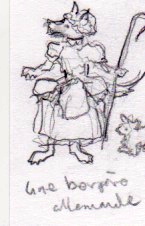From Benita Bendon Campbell, this reminiscence of a moment during her time in Paris with Ann Daingerfield Zwicky, many years ago:
Ann and I and aother friend were having afternoon tea at our local café on the Boulevard Saint Germain. The patron and patronne had just acquired a German shepherd puppy named Rita. In French, a German shephejrd is “un berger allemand.” Our friend remarked that Rita must be “une bergère allemande” — or a Gereman shepherdess. That is funny in French as well as in English. (The correct form is “une femelle berger allemand.” The name of the breed is invariable.)
Bonnie’s sketch of une bergère allemande:

Just as there are two lexical items shepherd in English — one referring to someone who tends sheep, and one in the dog breed name German shepherd — so there are are two lexical items berger in French, differing semantically as in English. Both languages have distinct lexical items for a woman who tends sheep: English shepherdess (related to shepherd), French bergère (related to berger). So the joke works in both languages.
French has the additional complexity that it has grammatical gender, which shows up in grammatical agreement: un berger allemand (ambiguous between the two senses of a German shepherd) but une bergère allemande ‘a German shepherdess’, with both the article and and the adjective varying in form according to the grammatical gender of the noun. That makes the joke somewhat broader in French than in English.
September 15, 2013 at 10:03 am |
http://www.youtube.com/watch?v=X9kQ5zumZww
Funny, when I learned this song from my mother when I was a kid she left out the last couple of verses….
September 16, 2013 at 6:36 am |
[…] A blog mostly about language « Playing with French morphology […]
September 19, 2013 at 11:35 am |
I have a vague memory of once being told there was a difference between “shepherd dogs” and “sheep dogs” – the first were primarily guards – they belonged to the shepherd – and the second were herding dogs – they went with the sheep. Don’t know if that hold true, but there certainly are breeds with one or the other word.